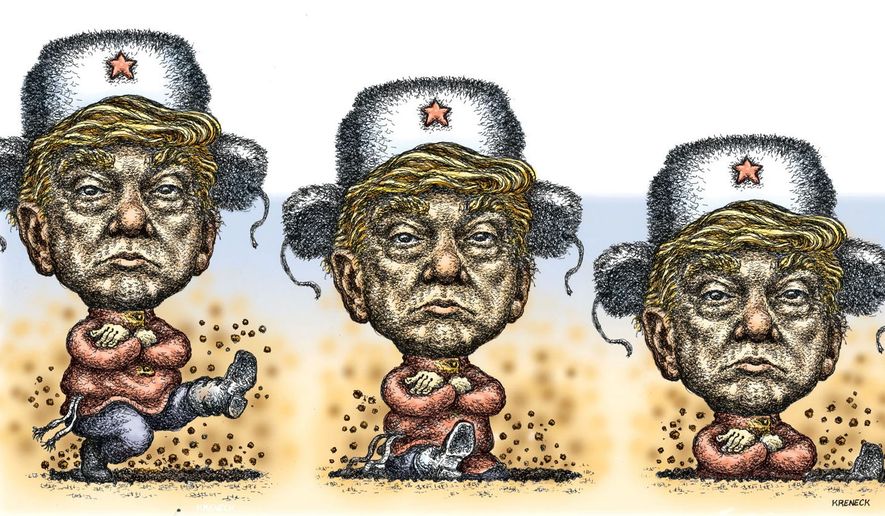OPINION:
In his first four months in office, President Trump has achieved the dubious distinction of being investigated by an independent prosecutor and at least five major oversight committees in Congress run by his own party.
The issues are deeply serious. Crimes may have been committed, lies have been told under oath, and Mr. Trump has allegedly attempted more than once to obstruct justice and shut down an official investigation into whether some of his top campaign advisers have engaged in collusion with the Russians to interfere with the 2016 election.
Mr. Trump insists that the whole story has been cooked up by his political enemies and promoted by the news media that he says is the “enemy” of the American people.
But our U.S. intelligence agencies have concluded that Russia in fact stole emails from the Democratic National Committee, planted fake news stories to Mr. Trump’s benefit, and otherwise meddled in our election in ways that are still being uncovered.
We now know that U.S. Attorney General Jeff Sessions — who told the Senate Judiciary Committee during his confirmation hearing “I did not have communications with the Russians” — was flat out false.
He admitted later that he did meet with the Russian envoy twice and subsequently agreed to recuse himself from any and all investigations into the Russian scandal.
What did Mr. Sessions and the ambassador talk about? That remains unknown for now, but is certain to come out as the investigation gets underway in the months to come.
Then it was learned that retired Gen. Michael Flynn, Mr. Trump’s former national security adviser, also met with the Russians and lied about it to federal investigators. Mr. Trump fired him after he learned that Mr. Flynn lied to his vice president, too, about his meetings.
The Senate Intelligence Committee has recently issued a subpoena demanding all of Mr. Flynn’s records that provide details of his contacts with Russian officials. But he has adamantly refused to comply with the order, hiding behind his Constitutional Fifth Amendment right against self-incrimination.
Now the committee must decide whether Mr. Flynn should be held in contempt of its lawful request.
Others in Mr. Trump’s campaign have had similar contacts with the Russians, as former CIA director John Brennan made clear in his testimony before the House Intelligence Committee earlier this week.
“I was worried by a number of the contacts that the Russians had with U.S. persons,” Mr. Brennan testified under oath on Tuesday. While he said he did not see absolute evidence of collusion at the time he left office on Jan. 20, he said he “felt as though the FBI investigation was certainly well-founded and needed to look into those issues.”
Then Mr. Brennan added this telling observation: “It should be clear to everyone that Russia brazenly interfered in our 2016 presidential election process.”
That is at the core of the FBI’s investigation, and now a central target of special counsel Robert S. Mueller III who has widened the scope of his investigation to include any and all findings of a cover-up by the president and his chief advisers.
In a blockbuster story broken by The Washington Post this week, Mr. Trump urged two of the government’s highest intelligence officials to help him “push back” against the FBI’s investigation into any collusion between the Russian government and his campaign.
In two separate requests, the president has asked the director of national intelligence, Daniel Coats, and the director of the National Security Agency, Adm. Michael S. Rogers, “to publicly deny the existence of any evidence of collusion” with the Russians during his 2016 presidential campaign, the Post reported.
Both men rejected Mr. Trump’s imperious demand, telling him that what he was asking them to do was alarmingly inappropriate, the newspaper reported Tuesday, saying its information came from two current officials and two former officials.
Notably, details of Mr. Trump’s conversation with Mr. Rogers was written up in a memo soon after the event by a senior NSA official.
This follows Trump’s earlier attempt to persuade FBI director James B. Comey to shut down his investigation into Michael Flynn’s contacts with the Russians. Mr. Comey of course refused and was subsequently fired by Mr. Trump.
Mr. Comey also wrote a contemporaneously detailed memo of his “uneasy” White House discussion with Trump — as he has with all his conversations with the president — and is expected to testify on the matter before Congress.
As we learned in the Watergate scandal that brought down President Nixon, it is not just the crime that matters but also the cover-up.
This week, the battle cry one hears most from Capitol Hill and the law enforcement community is “obstruction of justice.”
• Donald Lambro is a syndicated columnist and contributor to The Washington Times.




Please read our comment policy before commenting.